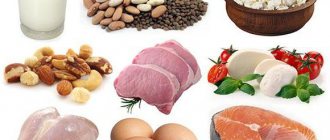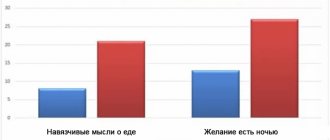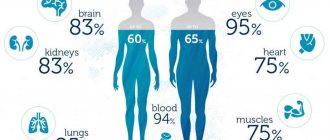How much protein is needed per 1 kg of weight to gain muscle mass. How to calculate the required volume and what to keep in mind when doing so.
Protein is a building material without which human muscles are not able to grow and recover. It is protein that scientists and doctors consider a substance that ranks second in importance after water. The element is involved in the construction of muscles, skin, hair and living tissues. In addition, it is present in hormones and enzymes. Each of us needs protein, especially athletes who aim to increase muscle size. But how much protein does a person need per day for muscle growth? What nuances affect the digestibility of such an important building material?
How many grams of PROTEIN does a girl need per day for muscle growth? Animal proteins
(this is meat, fish, eggs, chicken, seafood, cottage cheese, kefir, milk, etc.)).
Eggs and dairy products as a source of protein
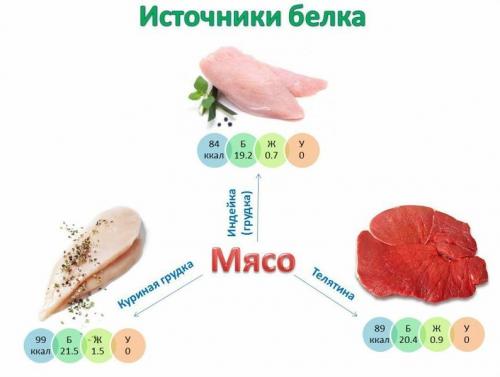
Meat (chicken breasts, veal, turkey) as a source of protein
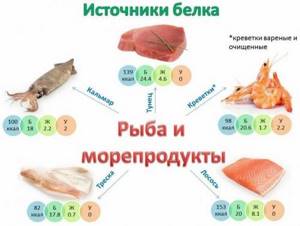
Fish and seafood as a source of protein
IMPORTANT: animal protein is much more important than plant protein.
I will say more: vegetable protein = is not taken into account at all when calculating the daily protein intake.
That is, only animal protein is considered (taken into account), vegetable protein does not count.
This is an important rule, remember it. The fact is that animal protein contains high-quality protein, which, in its amino acid profile, is more valuable in terms of obtaining nutrients from food than protein of plant origin.
Not only is plant protein low in protein, but it is also of poor quality. Understand? Actually, for this reason it is considered NOT COMPLETE (unlike animal protein).
That is, if you consume only one vegetable protein, without animal, then your muscles (which you want to pump up) will not receive enough of the necessary amino acids necessary for that very muscle growth, and as a result, all your efforts in the gym will be useless. Draw your own conclusions, I tell it like it is.

Homo sapiens, in order to grow muscles, needs a lot of protein of animal origin, because it contains the most optimal composition of amino acids necessary for the construction and renewal of muscle cells.
Training creates stress, which results in anabolic hormones triggering protein synthesis in the cell. For such a synthesis, amino acids are needed in sufficient quantity and quality... and this, as you may have already understood, is primarily a protein of animal origin...
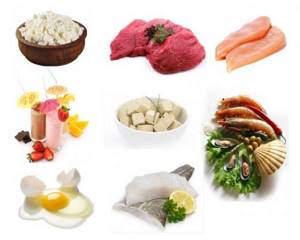
That’s why animal protein = better than plant protein, this time, and that’s why only animal protein is taken into account (counted), without plant protein (vegetable protein does not count).
However, we should not forget about vegetable protein (even though we don’t count it, it should be in the diet anyway), but in general, the ratio (only for protein) should look something like this:
80% is of animal origin, 20% is of plant origin.
Biological value of protein
What it is? This is an indicator of NITROGEN RETENTION in the body relative to its total amount supplied with this protein. In other words, this is an indicator of the preserved protein relative to the protein entering the body. Therefore, nitrogen balance is the main indicator of muscle growth (after all, our muscles are made of protein). If the NITROGEN BALANCE is POSITIVE, THEN THE MUSCLES GROW; if it is negative, then the muscles lose weight. Everything is very simple as you can see.
The most interesting thing for us now is that DIFFERENT protein sources have DIFFERENT ABILITIES TO RETAIN NITROGEN in the body. This means different benefits for the growth of your muscles. This ability is most often called the BIOLOGICAL VALUE OF PROTEIN. The higher it is, the better the protein will be for muscle growth. The lower they are, the worse...
How many grams of PROTEIN do you NEED per day for muscle growth? HOW MUCH PROTEIN YOU NEED PER DAY
At first glance it seems that this is a very simple question. You've probably heard a million times that in order to find out this amount, you just need to multiply your weight in kilograms by 2 (i.e., an athlete's need = 2 grams of protein for every kilogram of his weight). This is written about so often in magazines that most bodybuilders began to believe in it unconditionally. Moreover, these same magazines often write that 2 grams per kg of weight is too little if you are a really cool bodybuilder or an overly avid chemist. The explanation is always simple - bodybuilders have increased protein needs, which is why you need to use at least 2 grams. per kg of weight.

But with regard to the daily need for protein, everything is not as simple and unambiguous as it seems. For example, official medical standards are completely different. The World Health Organization recommends 0.75 grams of protein per kg, and Rospotrebnadzor of the Russian Federation recommends from 60 to 120 grams per day for adult men. Moreover, if the dose is increased to 3 grams per kg, doctors threaten health problems (overload of the liver, kidneys and other body systems).
But let’s say it’s most likely a lie that is harmful to health, because hundreds of thousands of bodybuilders around the world consume an increased dose of protein of 300-500 g/day and for some reason they don’t die like flies. And their liver does not fall off, despite the fact that many also use steroids. In other words, there is most likely no significant harm to health. But is there any benefit from such a large amount of protein? This is important to understand, because protein supplements, and simply high-quality protein nutrition, are the most expensive in the food basket. Is it all worth the money we spend on such large amounts of protein?
How much PROTEIN does a person need per day for health? How much protein should a person get per day?
The daily protein requirement for each person is individual and depends on:
- age;
- gender;
- physique and muscle mass;
- lifestyle and activity level.
That is why it is impossible to say unambiguously how much protein a person needs to consume per day. A petite older woman will require much less protein than the same amount that a muscular guy who works out at the gym five days a week would consume daily.
The Public Health Association has determined that the daily protein requirement for the average person is 90 grams.
According to the recommendations of the World Health Organization, the daily protein requirement for humans is 0.75 g per kilogram of body weight. But this is rather the minimum acceptable level of protein intake, which assumes its complete absorption from food.
In reality, up to 15% of the incoming protein is not absorbed, so nutritionists recommend increasing this value to 0.9–1 g/kg body weight. It should be taken into account that for pregnant and lactating women this figure is increased to 1.5 g/kg, and for people engaged in heavy physical labor and athletes – up to 2 g per kilogram of body weight.
Thus, the daily protein intake for middle-aged people with normal weight is:
- for women leading a sedentary lifestyle – 65–80g;
- for athletes – 120–150g;
- for pregnant and lactating women – 100–130 g;
- for men engaged in light work (office workers) – 75–100 g;
- for men engaged in heavy physical labor (loaders, miners) – 130–160 g;
- for athletes – 180–220g.
The female body absorbs protein worse and processes its excess into urea much more slowly, which is why the daily norm in women is lower than the male norm.
Often people involved in bodybuilding seek to further increase the amount of protein consumed to gain muscle mass. The same situation arises for those who want to lose weight on a protein diet. The daily protein intake increases to 3 g/kg body weight and above, and this is already fraught with serious health consequences. By acquiring a beautiful body, you can easily get digestion problems at best and kidney failure at worst.
Advice and recommendations from experts
When following a dietary diet, food should be consumed in small portions and at least 5-6 times a day. In addition to proteins, the diet must contain vitamins, minerals and trace elements for the proper functioning of the whole body.
Important!
Protein breakdown products must be eliminated naturally, and therefore you cannot do without intensive drinking - for this you can use non-carbonated mineral water or green tea.
Before going to bed, be sure to have a glass of kefir, fermented baked milk, or drinking yogurt. Those who have already normalized their weight need to focus their efforts on providing their muscles with enough protein.
This diet is suitable for every day protein diet for athletes:
- For breakfast – 2 bananas, a portion of cottage cheese with sour cream, tea with milk;
- Snack – muesli with milk and berries;
- Lunch – a portion of boiled meat, vegetable soup, grain bread, rose hip decoction;
- The next snack is a handful of unsalted raw nuts;
- Dinner – omelet, vegetable salad, grain bread and tea.
You can also drink a cup of coffee for breakfast, but without sugar, boil a few eggs, add a cracker. For lunch, it is useful to eat fish, beef, vegetable salad, washed down with tomato juice.
Advice!
Dietary foods that help activate energy balance are oatmeal with dried fruits, asparagus, broccoli, rice cake, protein drink, whey, fish, French loaf, beef tenderloin.
It is necessary to take into account that protein nutrition creates a load on the digestive organs, and therefore it is important not to oversaturate the stomach, but to eat food in moderation, and get up from the table with a slight feeling of hunger.
How much PROTEIN does a man need for muscle growth? How much protein do you need per day for muscle growth?
This figure may vary, you need to calculate it based on your weight and lifestyle. If you work out at the gym at least 3 times a week, your muscles need 2-3 grams of protein per 1 kg of body weight. This figure will help maintain muscle mass in tone, increase productivity and strength.
Nutritionists and sports doctors have been arguing over this issue for several years. Some say that 1 gram per 1 kg of weight is enough, while others say that it is better to stop at the number 4. But 1 gram is too little for a person who regularly plays sports, and 4 grams is too much. As a result, scientists came to the conclusion that the optimal figure is from 2 to 3 grams. The harder and more frequent the workout, the more protein the body requires.
Let's say you work out 3-4 times a week and besides, you have a mobile job, your weight is 70 kg. It turns out that you need 3 grams of protein per 1 kg, multiply and get the number 210. That's it, now you need to take this amount into account when creating a menu. And since 1 gram of protein contains 4 calories, multiply 210 by 4 and you get 840 calories per day, the rest should be fats and carbohydrates.
Protein sources for weight gain
Ideally, you should get as much protein as possible from healthy dietary sources. One of the pitfalls of trying to get all the protein from your regular diet is that you end up consuming foods that are also high in saturated fat and salt. Processed and fried meats should be avoided, so don't eat more hot dogs and salami. In this article we list some good sources of protein:
- healthy sources of protein
- vegetarian sources of protein
How many grams of PROTEIN do you need per day to lose weight? How many grams of protein do you need per day to lose weight?
In order for the weight loss process to occur as efficiently as possible, you need to plan everything correctly. You must have the right menu with the correct ratio of proteins, fats and carbohydrates + physical activity (properly scheduled workout). In this article I will tell you how many grams of protein you need per day to lose weight? How to calculate everything correctly, and I’ll give an example of the best sources of protein food.
Protein is one of the vital components for our body. If you do not consume enough protein, this will negatively affect the health of the entire body (problems with skin, hair, immunity, hormonal levels, etc.).
Also, this element is very important in the process of losing weight and drying the body. By the way, during drying it is much more important than during normal weight loss, because it is protein foods in combination with strength training that allows you to maintain muscle mass. When losing weight, you need to consume less protein, and when cutting, you need to consume more.
If the goal is -, then you need to consume 1.2 - 1.5 g of protein per 1 kg of body weight, if you are a woman (for example, if your body weight = 70 kg, then you need to do this: 1.5 * 70 = 105 g) and 1.7 - 2 g of protein per 1 kg body weight if you are a man (for example, if your body weight = 90kg, then you need to do this: 2 * 90 = 180g). When calculating, it is very important to take into account your initial percentage of subcutaneous fat. For example, if you are a woman and your height is 150 cm and your weight is 90 kg, then most likely your protein norm is 1.2 g per 1 kg of body weight (or maybe even 1 g per 1 kg). And if, with this height, your weight is 70 kg, then you need to multiply 1.4 - 1.5 g per 1 kg of body weight. That is, the more excess fat, the lower the number that needs to be multiplied by (the same applies to men).
If the goal is cutting, then you need to consume 1.5 - 1.8 g of protein per 1 kg of body weight if you are a woman and 2 - 2.3 g of protein per 1 kg of body weight if you are a man. In some cases, women can increase their protein intake to 2 grams per 1 kg of body weight, and for men up to 2.5 g per 1 kg of body weight. Do not need anymore. And then, to such standards it is necessary to raise only if the muscle mass begins to break down. If everything is normal (muscles are normal, and only fat is burned), then there is no need to increase protein.
You already understand how many grams of protein you need per day to lose weight. Now I want to talk about such a myth as: “The body can absorb no more than 30 g of protein in one meal.” Have you heard this? So, I’ll say right away that this is nonsense!
Each organism is individual, so it is stupid to say that everyone has the same rate of absorption of protein foods. Some people’s body really won’t be able to absorb more than 30g of protein at a time, but there are also those who can easily absorb up to 70g of protein at a time. Also, if you eat more than 30g, this does not mean that only 30g will be absorbed and the rest will go down the toilet. Your body can probably absorb all 70g, it will just take longer for it to do so (the food will take longer to digest).
Only experimentally can you find out how much protein your body absorbs at one time. Start eating small protein portions. Break down your entire daily protein intake so you get about 20g per serving. Gradually increase portions to 30, 40, 50 g of protein. If you increase the portion and there are no problems with the gastrointestinal tract + progress does not slow down, it means that your body calmly absorbs large portions of protein foods.




